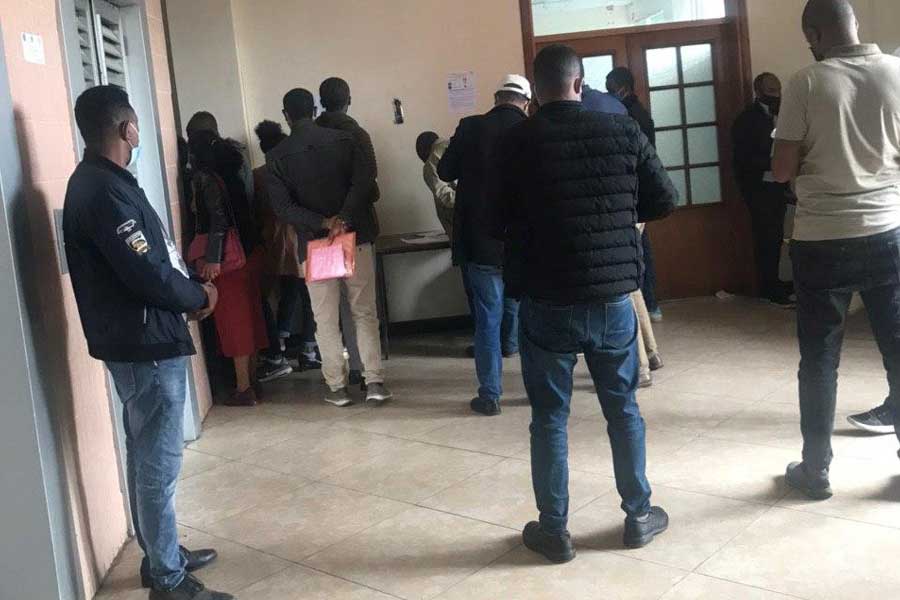
Fortune News | Aug 29,2020
A steering committee led by the Ethiopian Investment Commission is under formation to streamline employment at Hawassa Industrial Park, the largest of its kind in the country. The committee, which includes the presidents of the Southern and Sidama regional states, is being set up as a response to rising demand for employees at the Park, which is witnessing the revival of international buyers.
Facilitating the process to link unemployed youth at the weredaand zonal levels and inducting recruits through screening, orientation and the Park's channels are the committee's primary tasks.
Though it has long been under discussion, the idea for the committee came to fruition about a month ago, with regional heads committing to allocate a budget for the project, according to Belay Hailemichael, CEO of the Park representing the Ethiopian Investment Commission.
Members from the Hawassa Industrial Park management and the region's labour and job creation & enterprises development bureaus comprise a sub-committee. The committee's formation is expected to offer solutions to employment issues in the Park, which had seen an unprecedented decline in international business following the onset of the Novel Coronavirus (COVID-19) pandemic in the country.
In the first quarter of this fiscal year, the Commission had reported that over 11,000 employees had left their jobs at industrial parks across the country.
The Park usually sees high turnover around the beginning of the Ethiopian calendar year owing to the start of school, among other reasons, according to Belay.
"Most of the employees are at eighth or tenth-grade educational levels, so there is a tendency to go back to school as the new year starts," he said.
The season also coincides with the harvest time for cash crops across the country, which offers much better pay than the Park, according to him.
With over 80pc of industrial park employees being women, the concurrent wedding season means that many also leave their jobs to get married or start a family.
"These issues have been challenges in the four years since the Park was operational," said Belay. "Now, with international markets opening up again, we need more employees than ever."
Among the issues that have held it up thus far have been the costs related to hiring the employees. These include orientation, transportation and then accommodation of the recruits until they begin work.
In the months following the pandemic, nearly 7,000 employees left their jobs from Hawassa Industrial Park alone due to austerity cuts enacted by companies in the Park as their orders fell through.
However, things are looking up for these companies, which have begun expansion. Though levels may not be where they were pre-pandemic, garment orders are rising perhaps because international buyers expect a bigger summer market, according to Hibret Lemma, board member of the Park's Investment Association.
"Orders for July and August are increasing," he said. "This may have to do with COVID-19 vaccines being rolled out."
The break in the past few months, however, when orders were highly impacted and employees were on paid leave, is what has caused this rift, explained Hibret.
"It might take us another month to reinitiate hiring employees as companies were not hiring for months because of the pandemic," he said.
Last September, the MasterCard Foundation teamed up with a local company to launch its BRIDGES Programme, a five-year project which is aimed at creating a digital industrial park labour database implemented across seven selected parks. It will play a role in creating this employment market linkage.
Experts in the field stress the importance of creating human relations at the companies to get employees and retain them. Creating environments where informal relationships can develop among employees and with the management is important, according to Challa Amdissa, a lecturer at the public administration department at Addis Abeba University and a member of the Ethiopian Management Professionals Association.
"This creates emotional and psychological attachments to the job," he said.
"Providing competitive packages for the employees is another factor to consider," he said. "This could mean facilitating housing or other packages depending on where the employees' needs lie."
He added the benefits of creating a promotion plan as one way to retain employees. Despite the high level of unemployed youth in the country, retention is essential as it avoids extra training costs and the time spent to incorporate industrial work culture in a predominantly agricultural setting.
PUBLISHED ON
[ VOL
, NO
]

Fortune News | Aug 29,2020

Radar | Apr 24,2021

Radar | Jul 18,2020

Radar | Dec 19,2020

Fortune News | Jul 25,2020

Radar | Jun 29,2019

Radar | Dec 19,2020

Radar | Feb 22,2020

Radar | Sep 07,2025

Advertorials | Jun 05,2023

Dec 22 , 2024 . By TIZITA SHEWAFERAW
Charged with transforming colossal state-owned enterprises into modern and competitiv...

Aug 18 , 2024 . By AKSAH ITALO
Although predictable Yonas Zerihun's job in the ride-hailing service is not immune to...

Jul 28 , 2024 . By TIZITA SHEWAFERAW
Unhabitual, perhaps too many, Samuel Gebreyohannes, 38, used to occasionally enjoy a couple of beers at breakfast. However, he recently swit...

Jul 13 , 2024 . By AKSAH ITALO
Investors who rely on tractors, trucks, and field vehicles for commuting, transporting commodities, and f...

Oct 25 , 2025
The regulatory machinery is on overdrive. In only two years, no fewer than 35 new pro...

Oct 18 , 2025
The political establishment, notably the ruling party and its top brass, has become p...

Oct 11 , 2025
Ladislas Farago, a roving Associated Press (AP) correspondent, arrived in Ethiopia in...

Oct 4 , 2025
Eyob Tekalegn (PhD) had been in the Governor's chair for only weeks when, on Septembe...